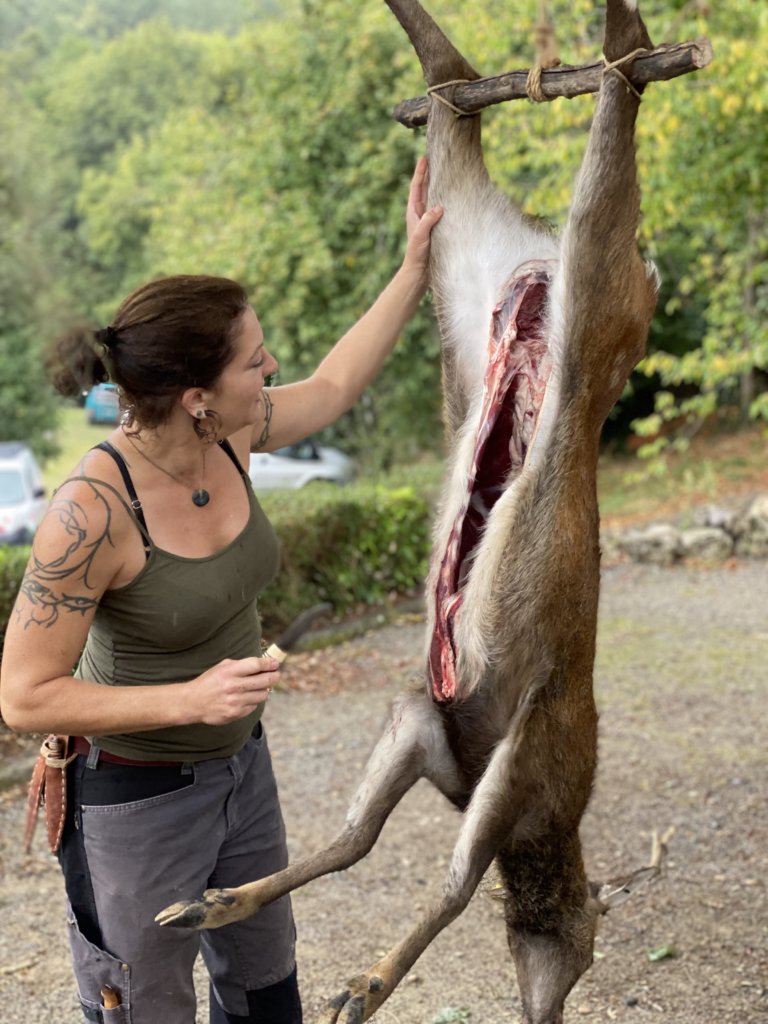
Début : 10 mars 2023 – 9h00
Fin : 12 mars 2023 – 16h00
Intervenante : Dr. Theresa Emmerich Kamper
Theresa ne parle pas français, mais alle sera accompagnée d’une assistante-traductrice 😉
Have you ever wondered what happens to the parts of an animal which don’t make it onto your grocery store shelves? This course covers some options for using those parts!
This course will introduce you to what parts of an animal are useful for what products and how to preserve those parts until they can be used. We will cover all basic butchery for both food and utilitarian items, as well as those parts not often seen as useful.
Multiple levels of technologies from stone to steel will be covered!
Some examples of what will be covered in the course are as follows:
–Organs: Removing, sorting and cleaning the edible organs as well as the utilitarian ones such as: brains for tanning the skin, the bladder for water bags and intestines for thread.
–Skin: Removing the skin, de-fleshing and preserving the skin for later and the making of hide glue
–Meat: Removing the meat, what cuts are best suited to different uses. How to debone, make roasts, jerky and soup meat. Basic meat preservation.
–Fat: How to render fat to preserve it.
–Bones: How to separate joints, bones as food, how to make tools from bones such as: skin processing tools, awls and needles, fishhooks, harpoon and arrow points, and jewellery.
–Sinew: How to remove, clean and preserve both backstrap and leg sinew and how to later process it for fibre for sewing, bowstrings, hafting, bow backing etc.
–Hooves: How to process the hooves for decorative items or for hoof glue.
–Antlers: If antlers are present how to remove them, and a discussion on how best to work with antler.
The length of the course will allow us to cover a wide range of introductory subjects but will not allow for the completion of finished projects. This course and the content covered will evolve based on time, weather, and participant interests!
Additional Information:
Duration: 3 days (Friday 10:00 am – Sunday ± 17:00 pm)
Group size: Min 6 – Max 12
Prerequisites: None
Included: All course materials and coffee/tea
Not included: Accomodation, meals
Lieu & commodités : Le Mas d’Azil, Ariège (09)
Le stage se déroulera au sein d’une grande propriété collective (chez nos voisins) située sur le piémont pyrénéen.
A l’intérieur, nous aurons accès à une salle de travail chauffée, une cuisine commune, un dortoir collectif, toilettes et douche.
A l’extérieur… tout est possible ! Prévoyez des vêtements adaptés aux conditions météo 😉
Repas :
Les repas ne sont pas compris dans le coût du stage.
Si vous le souhaitez, pour un supplément de 30€ nous proposons de prendre en charge l’ensemble de la nourriture (petit-déjeuner, déjeuner préparé par nos soins, dîner cuisiné ensemble).
Ceci-dit, chacun-e est chaleureusement invité à emmener ses spécialités à partager en mode « auberge espagnole » !
300€ (frais pédagogiques, matériel et matière première) + 10€/jour pour la location du lieu
À partir de 12 ans, mineurs accompagnés
Informations et réservations :
Pour toute information complémentaire ou pour vous inscrire, contactez-nous.
Afin de valider votre réservation, nous vous demanderons par la suite de nous faire parvenir par voie postale un chèque d’arrhes de 50€ à l’ordre de « Inspiration Sauvage ». Ce chèque ne sera pas encaissé et vous sera restitué le jour de votre arrivée ou en cas de désistement de votre part, au plus tard 15 jours avant le début du stage. Passé ce délai, le montant sera dû (et reversé à Theresa).